#Anglo-Italian Company
Text

Anglo-Italian Co.
Martin Son, Fabio Coruzzolo, Michele Pitossi and Jake Grantham
#Menswear#Pitti Uomo#Pitti Uomo 104#Anglo-Italian#Anglo-Italian Company#Martin Son#Fabio Coruzzolo#Jake Grantham#Michele Pitossi
290 notes
·
View notes
Photo

Jake Grantham.
4 notes
·
View notes
Text

#Jake Grantham#Anglo Italian company#barbour#style#mensfashion#vintagestyle#tailoring#sprezza#vintage Barbour#green
46 notes
·
View notes
Text
End of the line for corporate sovereignty
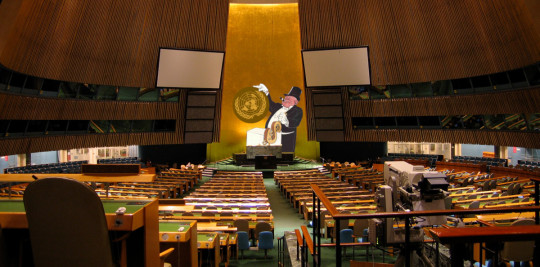
I'm on tour with my new, nationally bestselling novel The Bezzle! Catch me next weekend (Mar 30/31) in ANAHEIM at WONDERCON, then in Boston with Randall "XKCD" Munroe (Apr 11), then Providence (Apr 12), and beyond!

Back in the 1950s, a new, democratically elected Iranian government nationalized foreign oil interests. The UK and the US then backed a coup, deposing the progressive government with one more hospitable to foreign corporations:
https://en.wikipedia.org/wiki/Nationalization_of_the_Iranian_oil_industry
This nasty piece of geopolitical skullduggery led to the mother-of-all-blowbacks: the Anglo-American puppet regime was toppled by the Ayatollah and his cronies, who have led Iran ever since.
For the US and the UK, the lesson was clear: they needed a less kinetic way to ensure that sovereign countries around the world steered clear of policies that undermined the profits of their oil companies and other commercial giants. Thus, the "investor-state dispute settlement" (ISDS) was born.
The modern ISDS was perfected in the 1990s with the Energy Charter Treaty (ECT). The ECT was meant to foam the runway for western corporations seeking to take over ex-Soviet energy facilities, by making those new post-Glasnost governments promise to never pass laws that would undermine foreign companies' profits.
But as Nick Dearden writes for Jacobin, the western companies that pushed the east into the ECT failed to anticipate that ISDSes have their own form of blowback:
https://jacobin.com/2024/03/energy-charter-treaty-climate-change/
When the 2000s rolled around and countries like the Netherlands and Denmark started to pass rules to limit fossil fuels and promote renewables, German coal companies sued the shit out of these governments and forced them to either back off on their democratically negotiated policies, or to pay gigantic settlements to German corporations.
ISDS settlements are truly grotesque: they're not just a matter of buying out existing investments made by foreign companies and refunding them money spent on them. ISDS tribunals routinely order governments to pay foreign corporations all the profits they might have made from those investments.
For example, the UK company Rockhopper went after Italy for limiting offshore drilling in response to mass protests, and took $350m out of the Italian government. Now, Rockhopper only spent $50m on Adriatic oil exploration – the other $300m was to compensate Rockhopper for the profits it might have made if it actually got to pump oil off the Italian coast.
Governments, both left and right, grew steadily more outraged that ISDSes tied the hands of democratically elected lawmakers and subordinated their national sovereignty to corporate sovereignty. By 2023, nine EU countries were ready to pull out of the ECT.
But the ECT had another trick up its sleeve: a 20-year "sunset" clause that bound countries to go on enforcing the ECT's provisions – including ISDS rulings – for two decades after pulling out of the treaty. This prompted European governments to hit on the strategy of a simultaneous, mass withdrawal from the ECT, which would prevent companies registered in any of the ex-ECT countries from suing under the ECT.
It will not surprise you to learn that the UK did not join this pan-European coalition to wriggle out of the ECT. On the one hand, there's the Tories' commitment to markets above all else (as the Trashfuture podcast often points out, the UK government is the only neoliberal state so committed to austerity that it's actually dismantling its own police force). On the other hand, there's Rishi Sunak's planet-immolating promise to "max out North Sea oil."
But as the rest of the world transitions to renewables, different blocs in the UK – from unions to Tory MPs – are realizing that the country's membership in ECT and its fossil fuel commitment is going to make it a world leader in an increasingly irrelevant boondoggle – and so now the UK is also planning to pull out of the ECT.
As Dearden writes, the oil-loving, market-worshipping UK's departure from the ECT means that the whole idea of ISDSes is in danger. After all, some of the world's poorest countries are also fed up to the eyeballs with ISDSes and threatening to leave treaties that impose them.
One country has already pulled out: Honduras. Honduras is home to Prospera, a libertarian autonomous zone on the island of Roatan. Prospera was born after a US-backed drug kingpin named Porfirio Lobo Sosa overthrew the democratic government of Manuel Zelaya in 2009.
The Lobo Sosa regime established a system of special economic zones (known by their Spanish acronym, "ZEDEs"). Foreign investors who established a ZEDE would be exempted from Honduran law, allowing them to create "charter cities" with their own private criminal and civil code and tax system.
This was so extreme that the Honduran supreme court rejected the plan, so Lobo Sosa fired the court and replaced them with cronies who'd back his play.
A group of crypto bros capitalized on this development, using various ruses to establish a ZEDE on the island of Roatan, a largely English-speaking, Afro-Carribean island known for its marine reserve, its SCUBA diving, and its cruise ship port. This "charter city" included every bizarre idea from the long history of doomed "libertarian exit" projects, so ably recounted in Raymond Craib's excellent 2022 book Adventure Capitalism:
https://pluralistic.net/2022/06/14/this-way-to-the-egress/#terra-nullius
Right from the start, Prospera was ill starred. Paul Romer, the Nobel-winning economist most closely associated with the idea of charter cities, disavowed the project. Locals hated it – the tourist shops and restaurants on Roatan all may sport dusty "Bitcoin accepted here" signs, but not one of those shops takes cryptocurrency.
But the real danger to Prospera came from democracy itself. When Xiomara Castro – wife of Manuel Zelaya – was elected president in 2021, she announced an end to the ZEDE program. Prospera countered by suing Honduras under the ISDS provisions of the Central America Free Trade Agreements, seeking $10b, a third of the country's GDP.
In response, President Castro announced her country's departure from CAFTA, and the World Bank's International Centre for Settlement of Investment Disputes:
https://theintercept.com/2024/03/19/honduras-crypto-investors-world-bank-prospera/
An open letter by progressive economists in support of President Castro condemns ISDSes for costing latinamerican countries $30b in corporate compensation, triggered by laws protecting labor rights, vulnerable ecosystems and the climate:
https://progressive.international/wire/2024-03-18-economists-the-era-of-corporate-supremacy-in-the-international-trade-system-is-coming-to-an-end/en
As Ryan Grim writes for The Intercept, the ZEDE law is wildly unpopular with the Honduran people, and Merrick Garland called the Lobo Sosa regime that created it "a narco-state where violent drug traffickers were allowed to operate with virtual impunity":
https://theintercept.com/2024/03/19/honduras-crypto-investors-world-bank-prospera/
The world's worst people are furious and terrified about Honduras's withdrawal from its ISDS. After 60+ years of wrapping democracy in chains to protect corporate profits, the collapse of the corporate kangaroo courts that override democratic laws represents a serious threat to oligarchy.
As Dearden writes, "elsewhere in the world, ISDS cases have been brought specifically on the basis that governments have not done enough to suppress protest movements in the interests of foreign capital."
It's not just poor countries in the global south, either. When Australia passed a plain-packaging law for tobacco, Philip Morris relocated offshore in order to bring an ISDS case against the Australian government in a bid to remove impediments to tobacco sales:
https://isds.bilaterals.org/?philip-morris-vs-australia-isds
And in 2015, the WTO sanctioned the US government for its "dolphin-safe" tuna labeling, arguing that this eroded the profits of corporations that fished for tuna in ways that killed a lot of dolphins:
https://theintercept.com/2015/11/24/wto-ruling-on-dolphin-safe-tuna-labeling-illustrates-supremacy-of-trade-agreements/
In Canada, the Conservative hero Steven Harper entered into the Canada-China Foreign Investment Promotion and Protection Agreement, which banned Canada from passing laws that undermined the profits of Chinese corporations for 31 years (the rule expires in 2045):
https://www.vancouverobserver.com/news/harper-oks-potentially-unconstitutional-china-canada-fipa-deal-coming-force-october-1
Harper's successor, Justin Trudeau, went on to sign the Canada-EU Trade Agreement that Harper negotiated, including its ISDS provisions that let EU corporations override Canadian laws:
https://www.cbc.ca/news/politics/trudeau-eu-parliament-schulz-ceta-1.3415689
There was a time when any challenge to ISDS was a political third rail. Back in 2015, even hinting that ISDSes should be slightly modified would send corporate thinktanks into a frenzy:
https://www.techdirt.com/2015/07/20/eu-proposes-to-reform-corporate-sovereignty-slightly-us-think-tank-goes-into-panic-mode/
But over the years, there's been a growing consensus that nations can only be sovereign if corporations aren't. It's one thing to treat corporations as "persons," but another thing altogether to elevate them above personhood and subordinate entire nations to their whims.
With the world's richest countries pulling out of ISDSes alongside the world's poorest ones, it's feeling like the end of the road for this particularly nasty form of corporate corruption.
And not a moment too soon.

If you'd like an essay-formatted version of this post to read or share, here's a link to it on pluralistic.net, my surveillance-free, ad-free, tracker-free blog:
https://pluralistic.net/2024/03/27/korporate-kangaroo-kourts/#corporate-sovereignty

Image:
ChrisErbach (modified)
https://commons.wikimedia.org/wiki/File:UnitedNations_GeneralAssemblyChamber.jpg
CC BY-SA 3.0
https://creativecommons.org/licenses/by-sa/3.0/deed.en
#pluralistic#isds#investor state dispute settlement#steven harper#canada#canpoli#ukpoli#honduras#prospera#roatan#Energy Charter Treaty#ect#eu#rockhopper#world bank#charter cities#cryptocurrency#libertarian exit#Xiomara Castro
220 notes
·
View notes
Note
i know new york being the ancestral homeland of jews is a joke but as a jew from europe it literally feels that way. like i cannot imagine like a whole street written in hebrew. like i want to go there just to see that. i dont think jews inthe united states are aware of how good they have it
i do want to note that america is also a settler colonial state and its only because of specific american aims of the settler project and material realities of the economy and the physical land they were trying to settler that theyve had this “melting pot” ideology where jews were incorporated similarly to italian and irish immigrants, instead of continuing to have deeply ingrained religious and cultural antisemitism like europe. there were in some periods of us history more restrictions on jewish immigration and some institutional barriers for jews, especially before and during ww2, but never to the same degree as europe. although american jews were rarely (if ever, i dont know any examples but there could be some) violent genocidal settlers like the anglos and generally migrated later, we were still settlers searching for economic interests provided by american expansion on native land. that being said were here now and have the status of any other american settler (meaning people who arent indigenous or descended from enslaved people brought here against their will) most indigenous theorists and activists maintain that they want sovereignty, reparations, companies to stop destroying native land, etc, not every american settler to leave. i really believe that the united states also must fall, but i dont think this makes us like not belonging, at least any more than the other settlers.
i just want to say this to explain that my love for new york and the east coast us is complex. objectively the multicultural and cosmopolitan aspects of nyc that make it unique are products of american imperialism– for example nyc is the most linguistically diverse city in the world! over 600 languages are spoken here, including languages that arent spoken anywhere else anymore, but think about why that is. and the flourishing of jewish communities and culture in parts of the us was a product of specific historic processes and policies, and we like any other descendants of settler-immigrants have to grapple with that. i think its possible to oppose and fight against american imperialism and settler colonialism and still deeply appreciate the contradictory aspects of culture in america. (which lbr all the dynamic and interesting and worth preserving things about american culture were not created by anglos, but by outsiders and oppressed people) anyways this is all just to say im really not coming at it from a nationalist perspective but a diaspora perspective but yeah, new york is such a jewish city its genuinely incredible. this is why i especially despise tri state area zionists... youre ignoring that you live in the greatest place in the world for jews. literally the most jewish city in the world. like theres a moving company called schleppers here, yiddish words are part of everyones dialect, you can get the best jewish food everywhere from delis that are like 100 years old, we literally have a truck called the mitzvah tank that chabad drives around and asks people on the street if theyre jewish. the only romaniote synagogue in the western hemisphere is here and they have a greek jewish festival every year (which unfortunately is always covered in israeli flags -_-) the whole foods by one of my work sites had a sign up for yom kippur catering because the neighborhood is so jewish.
jewish culture and history and jews in general are just part of the fabric of life in new york. also whatever street youre talking about was probably written in yiddish since thats what most of the hassidic jews speak here! nyc has the largest concentration of yiddish speakers, which isnt surprising, and its the 8th most spoken language in nyc. theres also a big and still growing bukharian community here too. if you ever can, i really recommend visiting new york. theres so much jewish culture and history here. a lot of american jews live much more isolated, so i cant speak for them, but for many parts of the north east i feel that were lucky. antisemitism exists here but idk ive grown up in pretty jewish areas and never really experienced it. europe sounds legitimately shitty. also... fun fact, netanyahu went to high school in the suburbs outside of philly


^my photos in the lower east side, and heres some photography of hassidic williamsburg too
also williamsburg

82 notes
·
View notes
Note
[1] `there are often translations available in other languages long before English ones` This is really interesting! I'm familiar with translation in games, where english is often a very early target (a small game might get 0-5 translations, depending on amount of text) because the size of the market is larger.
[2] Do you happen to know why this is different for books? Is it faster to come to a deal about publication rights for some other languages to get started on the translation? Is translation to english harder (at least from French) than to say, Spanish?
The literary translation situation has long been very dismal in the English-speaking world! I don’t know a lot about video games, but are localisations provided by the company that makes the game? Because if that's the case it makes sense that games would get translated into English as a priority. For literary translations which are imported rather than exported, other countries have to decide to translate a foreign author and anglo countries (US, UK and Canada at least) are not very interested in foreign literature. There's something known as the "3% rule" in translation—i.e. about 3% of all published books in the US in any given year are translations. Some recent sources say this figure is outdated and it’s now something like 5% (... god) but note that it encompasses all translations, and most of it is technical translation (instruction manuals, etc). The percentage of novels in translation published in the UK is 5-6% from what I’ve read and it’s lower in the US. In France it's 33%, and that’s not unusually high compared to other European countries.
I don't think it's only because of the global influence of English* and the higher proportion of English speakers in other countries than [insert language] speakers in the US, or poor language education in schools etc, because just consider how many people in the US speak Spanish—I just looked it up and native Spanish speakers in the US represent nearly 2/3rds of the population of France, and yet in 2014 (most recent solid stat I could find) the US published only 67 books translated from Spanish. France with a much smaller % of native Spanish speakers (and literary market) published ~370 translations from Spanish that same year. All languages combined, the total number of new translations published in France in 2014 was 11,859; in Spain it was 19,865; the same year the US published 618 new translations. France translated more books from German alone (754) than the US did from all languages combined, and German is only our 3rd most translated language (and a distant third at that!). The number of new translations I found in the US in 2018 was 632 so the 3% figure is probably still accurate enough.
* When I say it’s not just about the global influence of English—obviously that plays a huge role but I mean there’s also a factor of cultural isolationism at play. If you take English out of the equation there’s still a lot more cultural exchange (in terms of literature) between other countries. Take Olga Tokarczuk’s Drive Your Plow Over the Bones of the Dead; it was published in 2009, and (to give a few examples) translated in Swedish 1 year later, in Russian & German 2 years later, in French, Danish & Italian 3 years later, in English 10 years later—only after she won the Nobel. I’m reminded of the former secretary for the Nobel Prize who said Americans “don't really participate in the big dialogue of literature” because they don’t translate enough. I think it's a similar phenomenon as the one described in the "How US culture ate the world" article; the US is more interested in exporting its culture than in importing cultural products from the rest of the world. And sure, anglo culture is spread over most continents so there’s still a diversity of voices that write in English (from India, South Africa, etc etc) but that creates pressure for authors to adopt English as their literary language. The dearth of English translation doesn’t just mean that monolingual anglophones are cut off from a lot of great literature, but also that authors who write in minority languages are cut off from the global visibility an English translation could give them, as it could serve as a bridge to be translated in a lot more languages, and as a way to become eligible for major literary prizes including the Nobel.
Considering that women are less translated than men and represent a minority (about 1/3) of that already abysmally low 3% figure, I find the recent successes of English translations of women writers encouraging—Olga Tokarczuk, Banana Yoshimoto, Han Kang, Valeria Luiselli, Samanta Schweblin, Sayaka Murata, Leila Slimani, of course Elena Ferrante... Hopefully this is a trend that continues & increases! I remember this New Yorker article from years ago, “Do You Have to Win the Nobel Prize to Be Translated?”, in which a US small press owner said “there’s just no demand in this country” (for translated works); but the article acknowledged that it’s also a chicken-and-egg problem. Traditional publishers who have the budget to market them properly don’t release many translations as (among other things) they think US readers are reluctant to read translated foreign literature, and the indie presses who release the lion’s share of translated works (I read it was about 80%) don’t have the budget to promote them so people don’t buy them so the assumption that readers aren’t interested lives on. So maybe social media can slowly change the situation by showing that anglo readers are interested in translated books if they just get to find out about them...
#ask#anyway it's difficult to find accurate stats for translation and compare between countries because some % you see are#for all translations and as i said technical translations / computer manuals etc make up the bulk of it#some % are averages over decades; others only for fiction or for novels & poetry etc so you end up comparing apples and oranges#but the fact remains that the three percent website (translation database) was able to list every single literary translation#published in the us year after year and it was never higher than 600-ish titles in the 2010s. it's not great#when you see much smaller countries release translations in the thousands or tens of thousands#it's also not a huge improvement over the 400-ish yearly US translations in the 00s#but they haven't released numbers for the past few years and maybe the situation is a bit better now
366 notes
·
View notes
Note
Horror of horrors! I let my 19th century man take a Grand Tour for enrichment purposes, but he has, unfortunately, now arrived in Italy. He has begun eating—GARLIC! In most of his meals. How am I supposed to convince him to drop this deplorable habit when even the ladies in Italy eat garlic? Please help me save my Man from the cruelest of fates—becoming Italian!!!
Hope is not lost! There's a lot more information I need to know before I can give you my condolences for hearing the dirge of the organ-grinder.
While today we think of Englishmen as being harmed by garlic and sunlight, and unable to enter a residence without a proper invitation—historically they have eaten a spicier diet, with Indian influences like Mulligatawny Soup from over 200 years ago. It's the late Victorian types (ironically raised on imperialist adventure fiction for boys) who need their plain toast cut into pieces before they can consume it.
An earlier 19th century Englishman might be a fan of celebrity chef William Kitchiner. The 1822 (fourth) edition of his Cook's Oracle sings the praises of "the Whip and Spur that Students of long standing in the School of Good Living are generally so fond of enlivening their palate with, i.e. Cayenne and Garlick" and has many spicy and garlicy recipes.
As The Practical Cook, English and Foreign of 1845 acknowledges, "there is scarcely an English family among the higher or middle classes, who does not number among its members a retired military or civil servant of the East India Company" and he probably has a taste for Anglo-Indian cookery, so the book has a whole chapter. Your early-mid 19th Englishman enjoys a variety of ethnic cuisines and may even relish an Irish stew!
Here is another possibility: could your "English" man actually be French? You might not think of this prospect, but the reality is there are a lot of 19th century French anglophiles who love their redingotes and twine anglais. Every 19th century man aspires to speak la langue de Molière—but when he orders a cup of coffee on his trip to Paris, does the waiter give him a knowing nod and bring him Le Charivari with his beverage, or start speaking English and offer him The Times?
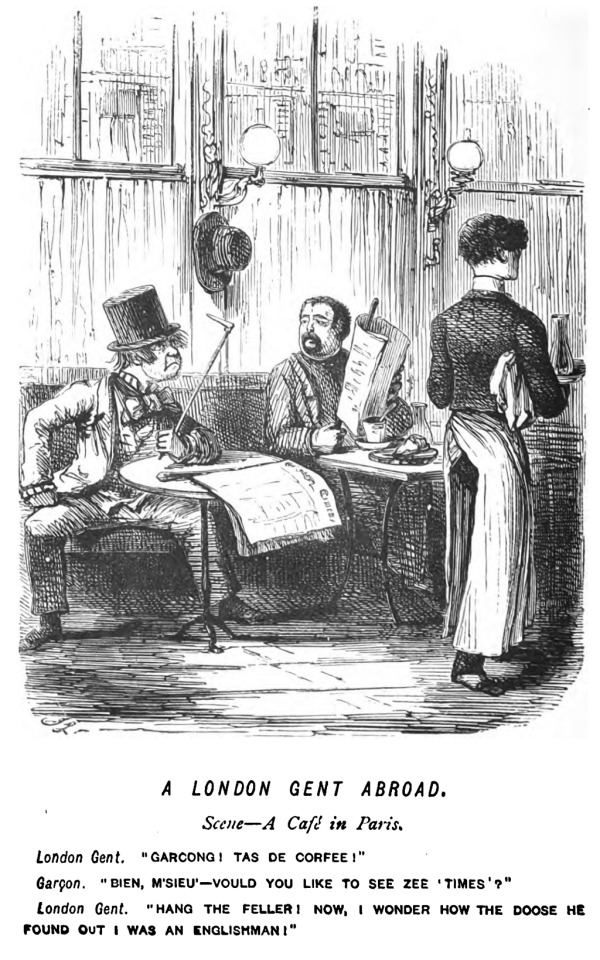
Even in the latter case, he may have only developed an unfortunate predilection for the pungent allium. It's not that uncommon for a 19th century man to enjoy piquant recipes—yes, even if he's English.
You can try offering him a variety of foods to break him from this Mediterranean passion, as he may find that less highly spiced foods agree more with his digestion (which will be true especially as he ages).
#is the 19th century man okay#food#garlic#mid 19th century#early 19th century#cookbooks for the 19th century man#asks#john leech my beloved
54 notes
·
View notes
Text

First of all, I'm going to assume that European merchandise licensors were much more open and less demanding than American licensors. Iginio Straffi's interviews regarding his relationship with the United States... have never been particularly positive... So even when Winx was successful during the 4kids days in anglo countries, they always did their own thing with merch instead of importing from Italy (as it was the case in Europe. There is very little info on merch in Asia and North Africa, nor do I know anything about Latin America). Rainbow also continued its own english dub with cinelume to release in Italian dvds as a second language option, even though most of these DVDs never came out outside Italy (all texts on the cases are in Italian)
Second, of course Winx was much more popular in Europe and its native country! Im sure this is due to different broadcaster laws, allowing for anime to fester on free TV mostly everywhere in Europe. Some countries like Spain had stuff uncensored, while Italy, which never had proper censorship laws, was entirely relying upon the broadcaster's will to censor or not. Laws regarding "cartoons must be educational on free channels" do not exist.
...so, in short, Winx Club did very well in ratings since it aired during the classical "anime" slots, at least in Italy. In fact, Pretty Cure took its place whenever Winx Club had finished airing and another series was needed on Rai 2 back in 2005 and onwards, until Heartcatch (then Saban came and ruined all international deals for Precure).
Third, magical girls dominate Europe. The anime import far outweights american animation import, girly toys sell more, so you have a ton of magical girl anime doing better in Spain, Germany and Italy than anywhere else. 4kids said Doremi and Tokyo Mew Mew were unmarketable? Doremi and TMM toys, dolls, school supplies and magazines were all the rage in Italy. Watching Shoujo and Magical Girls has always been common in Italy, to the point it became a media case on Sailor Moon being too popular with boys (this was before Dragonball was redubbed in Italy, and then took over a new generation). Iginio Straffi confirmed that viewers were half boys and half girls in old interviews and recently said that during tests boys were in love with the Winx girls.
Winx came out at the peak of fighting magical girl popularity and had the "Playing at home" advantage. Marketing with no japanese gigantic licensors in between was so much easier, coming straight from a small Italian company instead.
8 notes
·
View notes
Text

Bhandari marble company India 🇮🇳 Luxury home 🏡, high class Villa, five star hotel 🏨, projects, residential towers, commercial malls, jewellery showrooms, in Mumbai, Delhi, Ahemdabad, Indore, Lucknow, Kanpur, Nagpur, Agra, Ludhiyana, Jalandher, Jammu, Mohali, Chandigarh, Karnal, Panipat, Sirsa, Ambala, Mukatsar, Faridabad, Shimla, Bhilwara, Jodhpur, Udaipur, Kota, Chittorgarh, Bhopal, Ujjain, Banglore, Kolkata, Channai, Jaipur, Hyderabad, Siliguri, Madinapur, Bankura, Gohati, Pune, Navi Mumbai, Thane, Noida, Gurgoan, Ghaziabad, Meerut, Patna, Bhubaneswar, Katak, Ranchi, Raipur, Vishakapatnam, Vijaywara, Rajmundri, Kasaragod, Kannor, Cochin, Belgam, Mysore, Trivendram, Khojikode, Mangalore, Hubli, Belgoan, Coimbatore, Erode, Salem, Madurai, Trichy, Pondicherry, Surat, Rajkot, Gandhinagar, Nagpur, etc. Make from our most cozy and charming Italian Statuario white, Carrara white, Bardiglio white, Calacatta white, Bianco white, Thasoss white, Volakas white, Michael Anglo white, Onyx white, Dover white, Venetino white, Arabescato white, Panda White, Banswara white, wonder white, Indian Statuario white, and pure white marble! Best quality Italian white, Imported white, Indian white, Onyx white marble Top Brand BHANDARI Design Concept and Ideation Living Room surfaces Dining Space surfaces and marble table tops Connecting The Indoor and Outdoor with marble staircases Lounge surfaces marble coffee table top and wall cladding marble tiles Bedrooms white marble flooring and wall decoration Conclusion FACT FILE
Designed by: DC BHANDARI
Project Type: Residential & Commercial Interior
Project Type:
Home, villa, hotel, and project
Location: all over India 🇮🇳 and throught the World 🌎
Legacy : 55 years
Project Size: All big and small
Principal Designer:
Mr Rahul
1 note
·
View note
Text
Events 3.29 (before 1960)
1430 – The Ottoman Empire under Murad II captures Thessalonica from the Republic of Venice.
1461 – Battle of Towton: Edward of York defeats Queen Margaret to become King Edward IV of England, bringing a temporary stop to the Wars of the Roses.
1549 – The city of Salvador, Bahia, the first capital of Brazil, is founded.
1632 – Treaty of Saint-Germain is signed returning Quebec to French control after the English had seized it in 1629.
1792 – King Gustav III of Sweden dies after being shot in the back at a midnight masquerade ball at Stockholm's Royal Opera 13 days earlier.
1806 – Construction is authorized of the Great National Pike, better known as the Cumberland Road, becoming the first United States federal highway.
1809 – King Gustav IV Adolf of Sweden abdicates after a coup d'état.
1809 – At the Diet of Porvoo, Finland's four Estates pledge allegiance to Alexander I of Russia, commencing the secession of the Grand Duchy of Finland from Sweden.
1847 – Mexican–American War: United States forces led by General Winfield Scott take Veracruz after a siege.
1849 – The United Kingdom annexes the Punjab.
1857 – Sepoy Mangal Pandey of the 34th Regiment, Bengal Native Infantry mutinies against the East India Company's rule in India and inspires the protracted Indian Rebellion of 1857, also known as the Sepoy Mutiny.
1867 – Queen Victoria gives Royal Assent to the British North America Act which establishes Canada on July 1.
1871 – Royal Albert Hall is opened by Queen Victoria.
1879 – Anglo-Zulu War: Battle of Kambula: British forces defeat 20,000 Zulus.
1882 – The Knights of Columbus is established.
1927 – Sunbeam 1000hp breaks the land speed record at Daytona Beach, Florida.
1936 – The 1936 German parliamentary election and referendum seeks approval for the recent remilitarization of the Rhineland.
1941 – The North American Regional Broadcasting Agreement goes into effect at 03:00 local time.
1941 – World War II: British Royal Navy and Royal Australian Navy forces defeat those of the Italian Regia Marina off the Peloponnesian coast of Greece in the Battle of Cape Matapan.
1942 – The Bombing of Lübeck in World War II is the first major success for the RAF Bomber Command against Germany and a German city.
1947 – Malagasy Uprising against French colonial rule begins in Madagascar.
1951 – Julius and Ethel Rosenberg are convicted of conspiracy to commit espionage.
1951 – Hypnosis murders in Copenhagen.
1957 – The New York, Ontario and Western Railway makes its final run, the first major U.S. railroad to be abandoned in its entirety.
0 notes
Text
Hein Feinbrot's Christmas Gift Guide 2023

Ladage & Oelke Dufflecoat

Anton Meyer 'Romulus' Tweed jacket

Natalino Undyed Jumbo Herringbone Wool/Cashmere Jacket

Drake's Ecru Boucle Wool Zip Fleece Vest

Fabian Zug English Suede Chelsea boots

Anglo-Italian Company Mid Wash Denim

Drake's Pink Brushed Shetland Mock Neck Jumper

Horatio 'Beaufoy' Black Grain Horsebit Loafers

Appenzeller Gurt Classic Belt

Opinel No. 9 Oyster knife
#Menswear#Gift Guide#Gift Guide 2023#Ladage & Oelke#Anton Meyer#Fabian Zug#Drake's#Drake's London#Natalino#Opinel#Anglo-Italian#Anglo-Italian Company#Horatio London#Appenzeller#Appenzeller Gurt#Appenzell Belt
31 notes
·
View notes
Text

Jake Grantham of Anglo-Italian Company.
0 notes
Text

#Jake Grantham#anglo Italian company#style#mensfashion#vintagestyle#tailoring#sprezzatura#sprezza#bespoke
22 notes
·
View notes
Text
Good morning TUMBLR - March 8th - 2024
''Mr. Plant has owed me a shoe since July 5, 1971."
Ch. X - Antwerp – Belgium - 1989
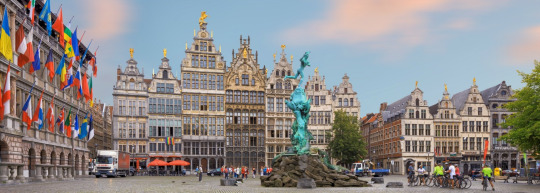
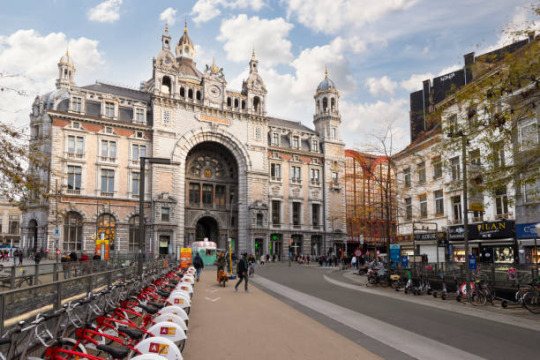
Central Station - Antwerp - Belgium
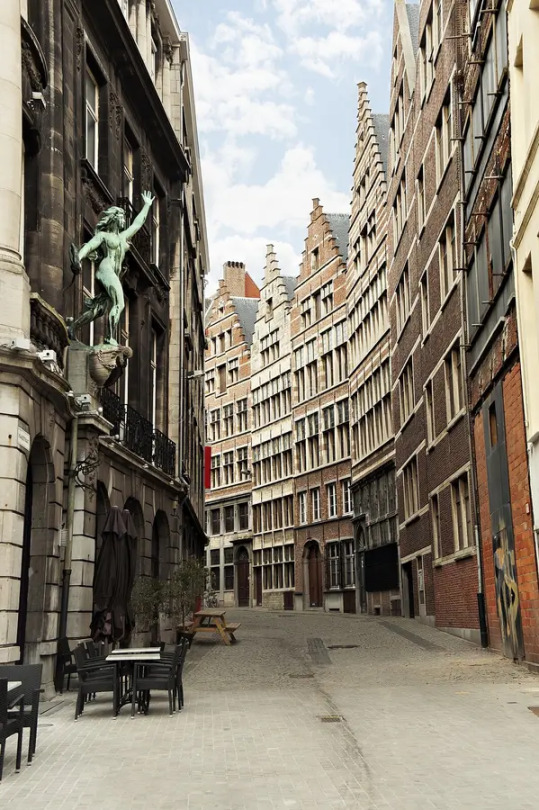
Kasstraat - Antwerpen - Belgium
In May 1989 I accepted FOSTER WHEELER's offer for a job position at FINA NESTE refinery in Antwerp, Belgium. To tell the truth, I considered this job a filler while waiting for SNAMPROGETTI or SAIPEM I exist.....
At first I didn't want to believe it: a European destination in a splendid city, and than I was keen to see what it was like to work with a large Anglo-American company.
Antwerp would shortly thereafter be, with full merit, ''European City of Culture'' for a year. Antwerp, its Flemish name, is a city of half a million inhabitants located on the Scheldt river, which after crossing the city, flows into the English Channel after few kilometers. Birthplace of Pieter Paul Rubens, whose birthhouse is now a splendid museum. I had rented an mansat in Kasstraat (Street of cheese makers) overlooking the beautiful Groote Markt, the central square of the city, where the Sunday flower market used to take place.
I had arrived in Belgium with the red A112 that I had bought a few years earlier, when I was working on the construction site in Milan. The country, which I had always been considered not particularly beautiful (it was in that period that I learned of the numerous jokes coined by the French about the Belgians) had instead turned out to be not bad at all. Perhaps not very varied, just a few hills in the Ardennes area, but very tidy and sprinkled of splendid cities such as Louvain for example.
Antwerp also enjoys a moderate climate, with rainy winters, yes, but never excessively cold.
THE PROJECT
It involving the construction of an ethylene plant inside the already operational FINA NESTE refinery. An old methanol plant was then demolished to make room for the new one. In the meantime, the price of ethylene on the world market had collapsed, so it was already known that once finished the plant would be put into ''conservation'' (waiting for the price to rise again).
The STAFF.
There were several Italians already present when I arrived, together with several Americans and British. There were just occasional relationships between the various nationalities, even if the climate on the construction site was good and jovial. The management of FOSTER WHEELER differed substantially from of the ENI group companies in terms of general organization and logistics. While with SNAMPROGETTI or SAIPEM the employee is taken in full charge by the companies - and is therefore told where to live, where to go to eat, what to do (or not do) even during hours outside of work. With FOSTER WHEELER the employee is guaranteed a monthly lump sum and than he has to manage the logistical aspects himself.
However, in addition to the positive aspects, there are also responsibilities that the employee does not have with SNAM or SAIPEM. For example, after leaving Belgium, I learned that some of my former colleagues had risked arrest for not paying taxes on the part of their salary received locally. Unpleasant situations that never happened with the ENI Group. The police even went to the house of one of them at 5.00 am, with the intention of arrest him - scaring his wife and son to death for that sort of raid.
ALL RETURN TRIPS FROM BELGIUM.
The fact of being in Europe and free led many colleagues without family in tow in Belgium to make trips back to Italy at the weekend, myself included. I tried any way, from traveling by car with a colleague (very tiring) to traveling by train. During one of these returns, as the train was passing through Luxembourg, I was subjected to particular treatment by the local police. At the time I was in possession of a ''double'' passport (one attached to the other) with many stamps from Arab countries. Therefore police guys politely asked to empty my suitcase in front of them - than they took me out of the compartment, closed the curtains, and reopened them only once the inspection ended. During this type of inspection by police forces from all over the world, my fear is always the same: that something illegal will be introduced into the luggage, and than create the excuse of a stop or arrest. Fortunately it has never happened to me in all my travels, but the fear of an unpleasant situation of this kind has recurred more recently during my return trips from Mexico.
It was end of November, I was in my mansart of Kasstraat and I received a phone call from an HR employee of SAMPROGETTI Milan.
''Are you still interested in going down to Morocco for the New Agadir Airport project''?
''Yes, I'm still interested, only 4 years have passed since you told me ''Go…go to Bahrain for a few months, until the project in Morocco is successful……''
''Well - says the guy - since it's something urgent and you have to go there as soon as possible, come here to our Head Office in San Donato as soon as possible, to complete all the procedures''
The next day I went to Brussels, and took the SABENA flight to Milan - from Linate airport, I reached the 5th Office Building and I was introduced into the presence of Mr. Pastacci.
It took just a few minutes to agree on salary, daily allowance, shifts and the fact that I would go to Morocco with my personal Range Rover - the same car that I had imported into Italy from Bahrain.
Than the usual discussion on the reimbursement of expenses incurred to return from Belgium, so as not to deny the reputation of ''Office of another Company'' that the SAMPROGETTI Personnel office carried with it.
Pastacci ''I can't reimburse you for the cost of the plane ticket, perhaps the train ticket''
Me: ''Do you remember that on the phone you told me to hurry? This is why I took the plane, otherwise I would have returned by train - so please refund me the cost of the plane ticket''
Pastacci ''Okay…I'll see if I can get it to put it on his first salary…''
Something I never understood is the behaviour of HR people toward other employees. When it comes to money, it looks it's THEIR personal money, not Company's money.
1 note
·
View note
Text
Antidesign

FDL, quattro Alba e a sinistra Pasifae alla Duodial a Milano, 1985
Design, a foreign word used in Italian with a single sense. The literal translation is a project but, with the uncritical genuflection towards the Anglo-Saxon language, in ours it has almost exclusively taken on a single specific meaning: a project aimed at the production of everyday objects. Antidesign, which I have used for some time, also has a single meaning: the production of objects "of use and of charm", as Pierre Restany suggested in the distant 80s.

FDL, Flamenco (lampada da tavola, 2003) su Ballerina 1 (tavolo in acciaio di cantiere e vetro, 1970)
Anti-design has its ambitions and the main one is to minimize the enslavement of the people who contribute to the production of the above objects. By slavery I mean that which, for reasons of survival, forces millions of unfortunate people to keep up with mass production machines, from the simple ones for making a screw to the more complex ones called five-way pantographs or robotics (the new frontier of technology, which tends to eliminate the mechanical work of the unfortunate - but also workitself tout court): have you ever met them on the assembly lines of small and large industrial production companies? The immense sadness of these poorly paid young people is standard. In short, to return to ambition, if you can reduce the screws or eliminate them altogether (we have understood each other).

FDL, Pasifae, tavolo da studio in quattro mezze pelli intere di vacca, 2011
Cutting it short: I'm interested in reducing slavery without affecting the volume of production: the first can be lessened by also entrusting the second to the consumer: if I'm able to make my own dining table, why buy one? But we are not so utopian and we take into account the old, the handicapped, “la casalinga (housewife) di Voghera” and the lazy because fatigue makes me a slave to execution. But maybe I'll get a taste for it! Of course, but I must have the tools, at least elementary if not complex, tools that are produced by others, thus expanding the ranks of unfortunate non-robots. In short, anti-design brings with it a lot of contradictions, not to mention that humanity in the last 50 years has gone from 3 to 8 billion individuals who need tables and not utopian discourses

FDL, Berenice, lampada in scarti di vetro pirex e scarti di rame, 1986
I do not make the preposterous claim to a solution to the arduous problem of slavery, not even in passing. Equipped with a minimum of dexterity, I stress minimum (my mother, since I wasn't studying, sent me to be a carpenter's apprentice in the eighth grade), however I suggest that you take into consideration that there is the concrete possibility of building your own objects of use (if not of charm) necessary to sit down at banquets, converse in the living room, perhaps sitting on an armchair, illuminate one's book with an abatjour or lamp of another type, place the same in a cheap bookcase, etc. I suggest, I don't impose. On the contrary, I follow up the suggestion with some practical advice that requires manual skills to a minimum, visual advice.

FDL, Meridiana, tavolo da salotto in crosta di marmo Pario e legno di segheria,1987
Don't worry, there is no copyright (another contradiction, the use of the hated English): the suggestion can be followed by anyone without problems. But you have to know how to look: my objects, that is, those produced to furnish my home and that of a few admirers (too few to be a hero - quote from Carver) are very simple and can be copied by any housewife. Just have a little optimism.

FDL, Vie minate, lampada in vetro e pietre, Ballerina e Pastorale, 1995
Of course you must like the suggestions, but the materials that I am attaching to the project (ohibò, design) are the cheapest and most common: no plastic, “ravaneto” marble, wood already used or recovered from any landfill, scrap iron from the forge, scrap glass from neon production etc. In short, a real trash can. But who doesn't have a trash can available?
FDL
0 notes
Text
Dr Greg's No Diet-diet Program And Products 5, Sandton, 2191
Together they have set a high normal of serious scholarship within the examine of architectural historical past in Johannesburg. In 1991, Mokgatle joined Eskom as a senior authorized adviser and moved up the ranks to be the first black particular person and first lady appointed as MD of the utility's transmission group, which she turned from lossmaking to worthwhile inside a year. She was involved with the restructuring of the Electricity Distribution Industry and chaired the board of the Holding Company. She has additionally been concerned in Energy Regulation in South Africa and was Deputy Chairperson of the Board of the National Energy Regulator. From 2003 to 2005 she was CEO of state rail parastatal Spoornet, now Transnet Freight Rail. The US president on the time, Ronald Reagan, came underneath fire for ignoring the rising AIDS crisis and when he finally addressed the epidemic — in 1987 — nearly 23,000 individuals had died of the disease.
He met and married Mary Chambers in England, and dedicated the following fifty two years to caring for her - she was wheelchair-bound having being identified early in their relationship with a quantity of sclerosis. Ironically, Lonsdale himself suffered a stroke in 2010, which confined him to a wheelchair. His wife survives him, as do his two daughters and 6 grandchildren. Former Senior Lecturer in Physiology at Wits, Professor Ralph Ernest Bernstein died on 19 October 2013, aged 99. He held BSc (1934), BSc Hons (1936) and MSc (1937) levels, and an MBBCh (Cum Laude) (1940) from Wits.
He labored part-time at University of Wisconsin and again on the University of Massachusetts, Amherst, where he accomplished a master’s in mechanical engineering. His marriage fell aside at this stage and Lance went to his grandparents in Italy to be raised as an actual Italian American. Dr Mankowski didn’t shine academically and left school a little bit of a dropout. He had a four-year spell at Fort Ord in the army (where he volunteered). There he met one or two mature younger males who inspired him to suppose about studying additional and an African American instructor who impressed in him a love of maths.
She hosted countless University features during Ellison’s tenure as Dean and as Deputy Vice-Chancellor. She tirelessly provided editorial assistance during her husband’s 50-odd years as editor of the South African Law Journal. A stalwart of the Jewish neighborhood, Lissoos was a founding member of the Victory Park Synagogue and previously served the King David Schools and Jewish Board of Education. He lectured and wrote on subjects of Jewish and common historical curiosity and delivered the keynote tackle at the opening of the South African Jewish Board of Deputies “Jewish Johannesburg 120” exhibition in 2007. Amongst a number of papers which he wrote and offered, was one within the South African Medical Journal in May 1963.
In 1963 he went to work for General Electric finally moving to British Rail the place he rose to the rank of Assistant Chief Mechanical Engineer primarily based in Derby. He later joined Brush where he remained till his retirement in 1991. Dr George St Ledger Warren (MBBCh 1942, Master of Surgery 1955) died in Parkmore, Gauteng in 2007, aged 91. Born in Johannesburg, Warren matriculated from Jeppe Boys High and studied medication at Wits, where he was president of the Students Representative Council, the Students Medical Council and a founding member of the squash club. He served as a medical officer in Italy during WWII and joined Anglo American as a medic thereafter. It was while working as a GP in South West Africa (Namibia) that he got interested in the emotional issues encountered generally practice.
In 2004, he established Voiceless, an animal rights advocacy organisation, with his daughter Ondine. He was also a connoisseur of fantastic food and wine and cultivated friendships with many people who served him at their well-appointed tables. He also took a lot delight in the reality that he saw himself as the Austin household historian.
In 2013 he was awarded a Gold Medal for his contribution to the university and community of Azaadville. In 1955, Dr Uys left for England together with his new bride Midge, a midwife. He spent three years at St Mary's in Manchester, and in the Canterbury and Isle of Thanet Group in Kent. He gained his MRCOG in 1958, and accomplished his coaching at King Edward VIII Hospital in Durban.
Unlike his three brothers who joined their legendary father, Archie, in stockbroking, Ian chose to go into regulation. He joined I Mendelow and Browde in 1977, changing into a partner in 1981, and remained with the agency in its numerous guises until he joined Fluxmans in 2012. Nisbet grew to become a consulting engineer of the Anglo American Corporation in 1972, and a deputy managing director of the Gold Division in 1974. He joined JCI in October 1980, and was appointed an executive director in 1981 and chairman and managing director of its Gold and Uranium Division in January 1982. He was described as “a humble man of science and historical past, a trainer, a philosopher and a devoted husband and father”. Dr Beorn Cloete Uys (MBBCh 1952) was born in Amersfoort initially of the Great Depression.
He moved freely in, and made contributions to circles the place the only value of entry was excellence and intelligence. Ramquar Ramasar was a life member of the South African Medical Association (SAMA). He recalled that at the first ever medical affiliation meeting that he attended, he, having sat within the entrance row, was advised throughout a break that he could not do so, and needed to have his tea in a separate room on the grounds of his race. He acquired the Dr KM Seedat Fellowship Award for long and dedicated service from the Family Practice Association in 1996. In his skilled capability he served as honorary medical advisor to the Natal Blind and Deaf Society and the Friends of the Sick Association (FOSA), an organization devoted to the care of sufferers with tuberculosis. He was additionally President of the Umzinto and Districts Indian Child Welfare Society.
Dr Gregory Facebook
This research proved to be the seminal work of his career, demonstrating the necessity to manage such fisheries on a multispecies foundation. He taught fisheries biology on the University of Papua New Guinea and started research into big clam progress rates. His analysis in this area contributed towards main aquaculture and re-stocking programmes of those near-extinct species. Dr Gonasilan Chetty (MBBCh 1992) died of a coronary heart attack on 10 August 2009, aged forty. Born on 26 April 1969, the previous Eastern Cape physician was a successful specialist in Johannesburg.
#Dr Gregory Hough South Africa#Dr Greg Hough South Africa#Dr Gregory#Dr Greg Hough#Greg Hough#Dr Gregory Hough#Dr Gregory Images#Dr Greg Hough Images#Dr Gregory Facebook#Dr Greg Hough Facebook
1 note
·
View note